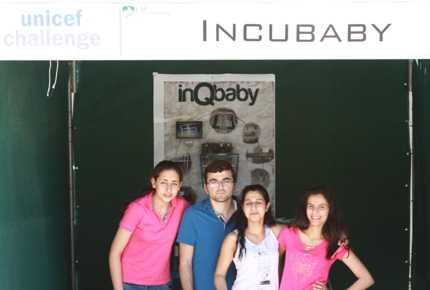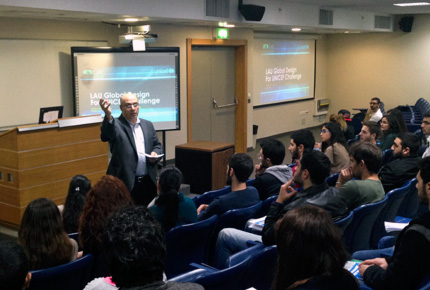LAU students set new standards during Global Design for UNICEF Challenge
From student-teacher interaction to student-real life interaction, LAU students use what they learn to save lives

Incubaby was inspired by the story of a Red Cross volunteer in a Syrian refugee camp in desperate need of an incubator.
This summer, LAU engineering and graphic design students, Bassel Kassem, Joyce El-Beyrouthy, Maha Yazbeck and Michelle Mansour, had to come up with a really exciting innovative solution to a pressing development problem when they signed up for UNICEF’s ground-breaking competition in Global Design.
The story of a Red Cross volunteer who responded to an emergency call from a Syrian refugee camp inspired them. “Prematurely born twins needed to be incubated but due to the high maintenance cost of such incubators not all hospitals have sufficient units. So we came up with the idea of developing a low-cost baby incubator,” Mansour explains, adding, “And Incubaby was born!”
According to UNICEF, “Students are ideal partners. They bring fresh ideas, familiarity with new technology and a passion for change.” Innovative on every level, UNICEF got exactly what it was looking for with the Incubaby, starting most importantly with the cost. At $500 the Incubaby costs one-tenth the price of a normal unit.
The students were also able to develop a system so that vital data is delivered to the healthcare worker’s mobile phone, freeing them from having to stay next to the baby 24/7. Being able to operate on batteries and PV cells also solved the critical issue of lack of electricity and made it fully green. To top it all off, taking up much less space than its regular counterpart, the Incubaby is perfect for use in less than ideal places, such as refugee camps.
This year, UNICEF asked three universities, LAU, the American University of Beirut and the City University of New York (CUNY), to partner with it in its Global Design Challenge. Of the 45 teams that completed the challenged, 13 were from LAU.
“The Outreach and Civic Engagement unit (OCE) forges international agreements with renowned partners from the United Nations in order to give LAU student leaders creative opportunities,” says Elie Samia, executive director of OCE who coordinated the project with the School of Engineering (SOE).
The Incubaby team not only came first between the LAU teams but also received 50% sponsorship from the OCE to attend its Global Outreach and Leadership Development-GOLD conference that was held at the LAU’s New York Headquarters and Academic Center in August. According to UNICEF’s Innovation Specialist for Lebanon, James Cranwell Ward, what LAU did in the challenge was “outstanding and unprecedented and set the bar really high in terms of professional output, synergy of work methodology and inter-office collaboration.”
SOE Dean George E. Nasr fully backed the project. “Our school supports this challenge as it extends education outside both the classroom and the university. It also provides an outstanding hands-on experience while helping the community,” he says.
Dr. Barbar Akle, who guided the project as part of the Instrumentation and Measurements course, praised the students’ work. “The students went above and beyond what was required. Another of our groups designed a quadcopter for transporting urgent goods in devastated areas at a very low cost.”
The Incubaby team will next year continue working on its venture, which UNICEF has promised to support to make available for the market, as part of their final year project.
For Kassem, the New York experience was unforgettable, “The rush we felt when we saw the faces of the other teams when we presented our project was incredible!” Mansour was equally moved, “When you are first exposed to engineering as a profession, no one tells you that it can have such a huge humanitarian aspect. UNICEF did not challenge us as engineers but as humans with engineering knowledge.”
More
Latest Stories
- LAU Engages High Schoolers With Creative Expression and Scholarship Awards
- How Does Digital Media Impact Our Brain?
- Community Development Takes Root at Capstone Presentation Day
- LAU Athletes Return Victorious from Athens and Belgrade
- A New Initiative Toward Harnessing Digital Transformation
- A Cardiovascular Conference to Streamline National Expertise
- Aspiring Engineers Compete for Scholarships at LAU
- The School of Engineering Delivers Immersive Learning Experiences


